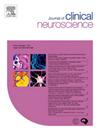Comorbid depression is associated with non-routine discharge following treatment of unruptured cerebral aneurysms
IF 1.8
4区 医学
Q3 CLINICAL NEUROLOGY
引用次数: 0
Abstract
Introduction
Psychiatric comorbidities such as depression have previously been associated with adverse outcomes after neurosurgical interventions. Non-routine discharge, defined as discharge to any location other than the patient’s home, has subsequently been associated with an increased likelihood of adverse post-discharge outcomes, readmission, and negative impacts on quality of life. To date, no prior studies have evaluated the association between depression, other psychiatric comorbidities, and clinical outcomes following surgical management of unruptured cerebral aneurysms (UCAs).
Methods
We conducted a retrospective analysis of the Nationwide Readmissions Database (NRD, 2016–2020). ICD-10-CM/PCS codes were used to select for patients who had (1) an unruptured aneurysm and (2) underwent open/endovascular treatment of their aneurysm. Patients with documented subarachnoid hemorrhage were excluded. Multivariable regression analyses were conducted to evaluate the association between comorbid depression and other psychiatric disease diagnoses (anxiety, schizophrenia, bipolar disorder, PTSD, etc.) with discharge disposition, length of stay (LOS), mortality, major complications, and 30-/90-day non-elective readmissions.
Results
From 2016 to 2020, 36,739 patients underwent repair (open or endovascular) of an UCA, and 15.4 % had a comorbid diagnosis of depression. Patients with depression were significantly more likely to have other psychiatric comorbidities such as anxiety (10.5 % vs 7.9 %, p < 0.001), identify as female (83.2 % vs 73.1 %, p < 0.001), and have an Elixhauser Comorbidity Index score of at least three (66.5 % vs 27.9 %, p < 0.001). After adjusting for covariates, both depression (RR 1.08, 95 % CI 1.02–1.14, p = 0.007) and other psychiatric comorbidities (RR 1.21, 95 % CI 1.14–1.29, p < 0.001) were associated with a higher likelihood of non-routine discharge. Depression was not associated with an increase in LOS or readmission rates; however, other psychiatric comorbidities were significantly associated with increases in both LOS (IRR 1.16, 95 % CI 1.09–1.24, p < 0.001) and 90-day readmission rates (OR 1.20, 95 % CI 1.05–1.38, p = 0.007).
Conclusion
In patients undergoing surgical intervention for UCAs, comorbid depression and other psychiatric diagnoses are associated with higher likelihood of adverse discharge dispositions. This should be further queried to identify underlying, modifiable targets of intervention that may improve patient outcomes and lower overall cost of care.
合并症抑郁症与未破裂脑动脉瘤治疗后的非常规出院有关。
精神合并症,如抑郁症,以前与神经外科干预后的不良结果有关。非常规出院,定义为在患者家中以外的任何地点出院,随后与不良出院后结果、再入院和对生活质量的负面影响的可能性增加有关。迄今为止,还没有先前的研究评估未破裂脑动脉瘤(UCAs)手术治疗后抑郁、其他精神合并症和临床结果之间的关系。方法:我们对全国再入院数据库(NRD, 2016-2020)进行回顾性分析。使用ICD-10-CM/PCS代码选择患有(1)未破裂动脉瘤和(2)动脉瘤接受开放/血管内治疗的患者。排除蛛网膜下腔出血的患者。采用多变量回归分析评估共病性抑郁症和其他精神疾病诊断(焦虑、精神分裂症、双相情感障碍、创伤后应激障碍等)与出院处置、住院时间(LOS)、死亡率、主要并发症和30 /90天非选择性再入院之间的关系。结果:从2016年到2020年,36,739例患者接受了UCA修复(开放式或血管内),15.4%的患者患有抑郁症合并症。抑郁症患者有其他精神疾病合并症的可能性更大,如焦虑(10.5% vs 7.9%, p)。结论:在接受手术干预的uca患者中,合并症抑郁症和其他精神疾病诊断与不良出院处置的可能性更高相关。这应该进一步询问,以确定潜在的,可修改的干预目标,可能改善患者的结果和降低总体护理成本。
本文章由计算机程序翻译,如有差异,请以英文原文为准。
求助全文
约1分钟内获得全文
求助全文
来源期刊

Journal of Clinical Neuroscience
医学-临床神经学
CiteScore
4.50
自引率
0.00%
发文量
402
审稿时长
40 days
期刊介绍:
This International journal, Journal of Clinical Neuroscience, publishes articles on clinical neurosurgery and neurology and the related neurosciences such as neuro-pathology, neuro-radiology, neuro-ophthalmology and neuro-physiology.
The journal has a broad International perspective, and emphasises the advances occurring in Asia, the Pacific Rim region, Europe and North America. The Journal acts as a focus for publication of major clinical and laboratory research, as well as publishing solicited manuscripts on specific subjects from experts, case reports and other information of interest to clinicians working in the clinical neurosciences.
 求助内容:
求助内容: 应助结果提醒方式:
应助结果提醒方式:


